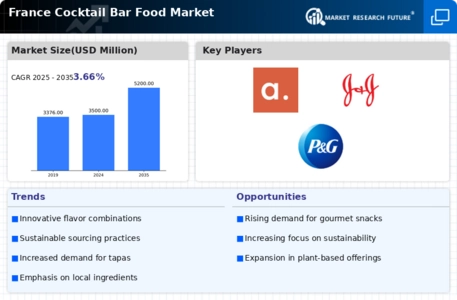Market Trends
Key Emerging Trends in the France Cocktail Bar Food Market
The France Cocktail Bar Food Market is experiencing notable trends that reflect the evolving preferences and dining habits of consumers in the country. One significant trend is the increasing popularity of artisanal and locally sourced ingredients. Consumers are showing a growing interest in the origins of their food, emphasizing quality and supporting local producers. This trend is particularly prominent in the cocktail bar food market, where patrons appreciate unique flavors and high-quality ingredients in their culinary and mixology experiences.
A key driver in the French cocktail bar food scene is the rise of healthier and more diverse menu options. With a heightened awareness of health and wellness, consumers are seeking alternatives that balance indulgence with nutritional considerations. Cocktail bars are responding by offering a broader range of options, including plant-based and gluten-free choices, catering to diverse dietary preferences and requirements. This trend aligns with the broader movement towards mindful and conscious eating in France.
The craft cocktail movement has taken hold in France, influencing the cocktail bar food market significantly. Consumers are increasingly interested in the artistry and craftsmanship of cocktails, leading to a demand for unique and creative food pairings that complement the drinks. The emphasis on handcrafted cocktails and culinary innovation has elevated the overall experience, encouraging cocktail bars to differentiate themselves by offering distinct and memorable food options.
Digitalization is shaping the landscape of the France Cocktail Bar Food Market. Online platforms and social media play a pivotal role in shaping consumer expectations and driving foot traffic to cocktail bars. Consumers rely on digital channels to discover new venues, explore menus, and share their experiences. Cocktail bars are leveraging these platforms not only for marketing but also to engage with customers, gather feedback, and stay attuned to emerging trends in real-time.
Sustainability has become a prominent factor in the French cocktail bar food scene. Consumers are increasingly concerned about the environmental impact of food and beverage consumption, prompting cocktail bars to adopt eco-friendly practices. This includes sourcing locally, minimizing food waste, and using sustainable packaging. Sustainability has become a key differentiator, influencing consumer choices and shaping the overall ethos of cocktail bars across France.
The evolving cocktail culture in France is contributing to the popularity of experimental and unique flavors. Mixologists are incorporating a diverse range of ingredients, including exotic fruits, herbs, and spices, to create signature cocktails with complex and sophisticated profiles. This trend extends to the food offerings in cocktail bars, with chefs experimenting with unconventional flavor pairings and presentations, providing a culinary experience that mirrors the innovation in the beverage sector.
Collaborations and partnerships are fostering creativity and diversity in the French cocktail bar food market. Bars are teaming up with local chefs, food artisans, and beverage producers to create exclusive and collaborative menu items. These partnerships not only contribute to the uniqueness of the offerings but also promote a sense of community and support within the local food and beverage industry.






Leave a Comment